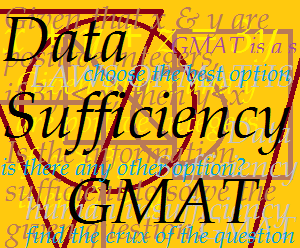~ by our Maths Faculty
My opening GMAT blog post will focus on Data Sufficiency, an important and unique Quantitative Reasoning question type in GMAT. Later on we’ll take up some sample questions to illustrate how to tackle this strange and interesting question type but first we will look at a fundamental point: why is DS important? Well, look at Figure 1 below
Figure 1
 What this pie chart tells us is that, out of 37 questions in the GMAT Quantitative Reasoning section, you can expect around 22 to 23 will be of the Problem Solving (PS) type and 14 to 15 of the Data Sufficiency (DS) type.
What this pie chart tells us is that, out of 37 questions in the GMAT Quantitative Reasoning section, you can expect around 22 to 23 will be of the Problem Solving (PS) type and 14 to 15 of the Data Sufficiency (DS) type.
Now, maybe you’re thinking that what this highlights is the importance of Problem Solving questions. But that is only the most obvious thing that the data says. The other important thing that it tells you is that if you want a good score in GMAT, you cannot afford to neglect Data Sufficiency. On the contrary, DS questions play a crucial role in converting mediocre GMAT scores into first-rate ones, so, if you ignore DS questions, that great GMAT score you are looking for may never be yours. Here’s why.
 When you are through with your initial preparation and have given 3-4 mock GMAT tests, like most other students, you will probably find your scores stagnating. There are various reasons for this, but, in Quant, if you find that your raw score is fluctuating between 43 and 46 out of 60, the reason will usually be low accuracy in DS.
When you are through with your initial preparation and have given 3-4 mock GMAT tests, like most other students, you will probably find your scores stagnating. There are various reasons for this, but, in Quant, if you find that your raw score is fluctuating between 43 and 46 out of 60, the reason will usually be low accuracy in DS.
The most important reason why many students don’t achieve high accuracy in DS is that they don’t think the way that DS demands. We never solve such questions either in school or in college so, we don’t really understand them and so, we end up ignoring or trying to avoid DS questions. But that, is a big mistake! Remember the stats: you can’t think of getting a good score in GMAT without mastering DS questions. So, how do you deal with the difficulties that this question type throws up? Watch for our next post and find out.
